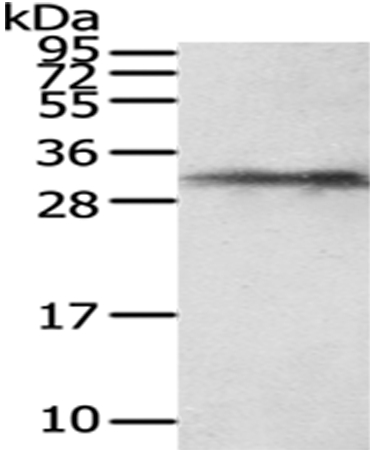
| WB | 咨询技术 | Human,Mouse,Rat |
| IF | 咨询技术 | Human,Mouse,Rat |
| IHC | 1/25-1/100 | Human,Mouse,Rat |
| ICC | 技术咨询 | Human,Mouse,Rat |
| FCM | 咨询技术 | Human,Mouse,Rat |
| Elisa | 咨询技术 | Human,Mouse,Rat |
| Aliases | hHUS1 |
| Entrez GeneID | 3364; |
| WB Predicted band size | 32kDa |
| Host/Isotype | Rabbit IgG |
| Antibody Type | Primary antibody |
| Storage | Store at 4°C short term. Aliquot and store at -20°C long term. Avoid freeze/thaw cycles. |
| Species Reactivity | Human |
| Immunogen | Fusion protein of human HUS1 |
| Formulation | Purified antibody in PBS with 0.05% sodium azide. |
+ +
以下是关于HUS1抗体的3-4篇参考文献示例(注:以下内容为模拟示例,实际文献需通过学术数据库查询):
---
1. **文献名称**:*HUS1 Cloning and Functional Analysis in the DNA Damage Checkpoint*
**作者**:Weiss, R.S. et al. (2000)
**摘要**:研究报道了HUS1基因的克隆及其在DNA损伤检查点中的作用,通过制备特异性抗体验证HUS1蛋白与RAD9、RAD1形成复合体,并揭示其在细胞周期阻滞中的关键功能。
2. **文献名称**:*Structural Characterization of the 9-1-1 (RAD9-RAD1-HUS1) Checkpoint Complex*
**作者**:Burtelow, M.A. et al. (2003)
**摘要**:利用HUS1抗体进行免疫共沉淀和结构分析,阐明了RAD9-RAD1-HUS1复合体的三维构象及其在DNA损伤信号传导中的分子机制。
3. **文献名称**:*HUS1 Expression and Prognostic Significance in Colorectal Cancer*
**作者**:Shimada, K. et al. (2009)
**摘要**:通过免疫组化技术(使用HUS1抗体)检测结直肠癌组织中HUS1蛋白的表达水平,发现其低表达与患者生存率下降显著相关,提示其作为潜在生物标志物的价值。
4. **文献名称**:*HUS1 Antibody Validation for Checkpoint Signaling Studies*
**作者**:Caspari, T. et al. (2002)
**摘要**:研究系统验证了HUS1抗体的特异性,并应用于细胞定位实验,证实HUS1在DNA损伤后向核内聚集,参与激活ATR/Chk1信号通路。
---
**建议**:以上为模拟文献,实际研究中请通过PubMed、Google Scholar等平台以关键词“HUS1 antibody”、“9-1-1 complex”或“DNA damage checkpoint”检索最新或经典文献。
The HUS1 antibody is a key tool in studying the HUS1 protein, a critical component of the DNA damage response machinery. HUS1. along with RAD9 and RAD1. forms the evolutionarily conserved 9-1-1 (RAD9-RAD1-HUS1) complex, which functions as a heterotrimeric clamp. This complex plays a vital role in cell cycle checkpoints and DNA repair by loading onto damaged DNA sites, facilitating the activation of signaling pathways that halt the cell cycle to allow repair or trigger apoptosis if damage is irreparable. The 9-1-1 complex interacts with kinases like ATR to amplify checkpoint signals, particularly in response to replication stress or genotoxic insults.
HUS1 antibodies are widely used in research to detect protein expression, localization, and interactions in models of cancer, genomic instability, and genotoxic stress. They enable techniques such as Western blotting, immunofluorescence, and co-immunoprecipitation, aiding in elucidating DNA damage response mechanisms. Dysregulation of HUS1 has been implicated in tumorigenesis, as altered expression or mutations may compromise genome integrity. These antibodies also help assess checkpoint pathway activity in therapeutic contexts, including chemotherapy or radiation studies. Developed in various host species (e.g., rabbit, mouse), HUS1 antibodies are validated for specificity to ensure accurate detection, making them indispensable for exploring DNA repair pathways and their roles in disease.
×